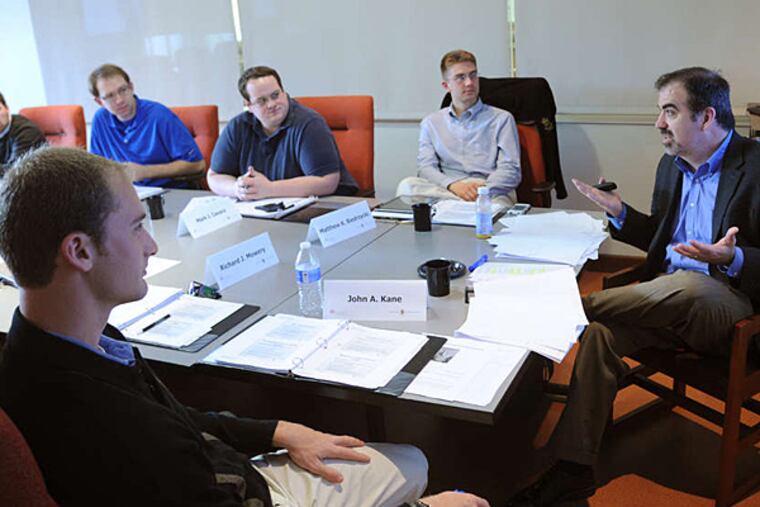For seminarians, some Wawa-inspired management training
Running a Wawa store and managing a Roman Catholic parish might not seem to have much in common. But last week, a group of St. Charles Borromeo Seminary students, a year from being ordained as priests, had the last of five management-training sessions inspired by a program that St. Joseph's University professors developed for the convenience-store chain.

Running a Wawa store and managing a Roman Catholic parish might not seem to have much in common.
But last week, a group of St. Charles Borromeo Seminary students, a year from being ordained as priests, had the last of five management-training sessions inspired by a program that St. Joseph's University professors developed for the convenience-store chain.
For the seminarians, the Thursday management classes at St. Joseph's Haub School of Business were in sharp contrast to the philosophy and theology classes that are central to their formation as priests.
"None of us entered the seminary to be administrators," said Stephan Isaac, one of the 11 attending the session last week.
But Isaac, who is from the Diocese of Allentown, added that he knew having the skills needed to run a parish smoothly - especially in dealings with the committees of parishioners who help guide it - was not a luxury for a pastor: "It's a necessity."
Bishop Timothy C. Senior, who has been rector at St. Charles Borromeo since July 2012, was prompted to start the Servant Leadership Program for seminarians after a breakfast meeting that fall with Howard Stoeckel, who retired that year as Wawa's chief executive.
He and Stoeckel were discussing their leadership visions when Stoeckel mentioned the training that Wawa managers were getting at St. Joseph's, Senior recalled in an interview.
Senior, a graduate of Lansdale Catholic High School, said he joked with Stoeckel about how great it would be "if every parish in the Archdiocese of Philadelphia ran as efficiently as a Wawa does."
One aspect of the Wawa model that he finds compelling is "the idea that we are there for the people, first and foremost," Senior said. "The goal is to engage them in a relationship so they will come back."
The Rev. Timothy F. O'Sullivan, pastor of Sacred Heart Church in Swedesburg, Montgomery County, said the training seemed to be a wise move.
"In addition to all of our past responsibilities and our spiritual responsibilities, de facto with the office as pastor comes administration and business responsibility," said O'Sullivan, who is managing last year's merger of three Bridgeport-area parishes into one. "Guys entering the seminary are not anticipating being business managers of a small corporation."
Senior called Haub dean Joseph A. DiAngelo Jr. and said he wanted the Wawa program for the seminarians.
"We did a survey of parish pastors and asked them, what are some of the challenges that they have seen with newly ordained coming into the parishes, what skills did they think they needed?" DiAngelo said.
Listening skills, working with parish councils, and consensus-building were among the needs mentioned by the pastors, he said.
At Thursday's class, led by Eric Patton, an associate professor of management at St. Joseph's, the topic was how to manage changes in technology, structure, and culture - especially in the context of parish mergers.
Wrapping up the five-week program on what he called "organizational behavior," Patton said: "It's not like accounting or finance, where there's a right or wrong answer."
The goal was to provide a framework for the men to rely on in the field.
John A. Kane, a seminarian from the Diocese of Raleigh, N.C., described the St. Joseph's program as a supplement to the four areas of priestly formation at the seminary: apostolic, spiritual, intellectual, and human.
"This was specifically targeting an area that we need," Kane said, but that is not otherwise covered.
Program Overview
The training helps future pastors improve their management and communication skills.
Leadership overview; servant leadership.
Individual learning approaches.
Perspective-taking; empathy and emotional Intelligence.
Conflict management; Influence tactics.
Empowering others.
Delegating effectively.
Engaging in difficult conversations.
Providing effective coaching and feedback.
Establishing and communicating vision.
Leading change.
SOURCE: St. Joseph's UniversityEndText
215-854-4651
@InqBrubaker